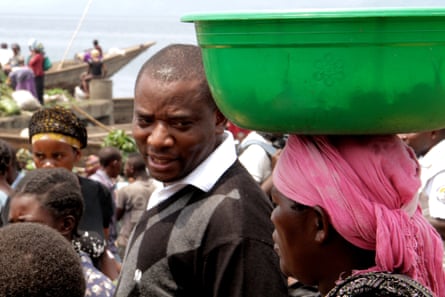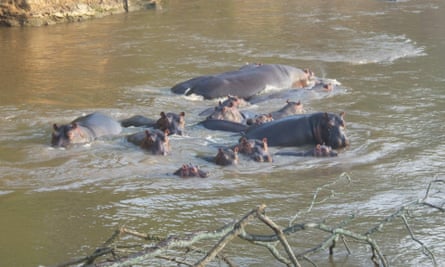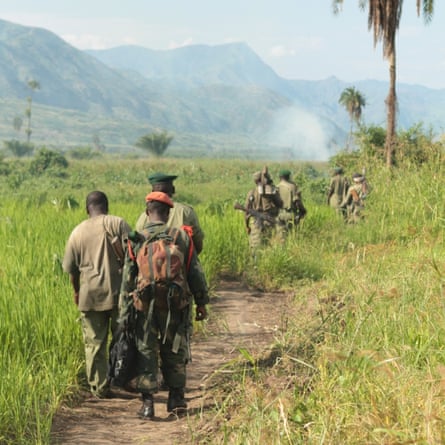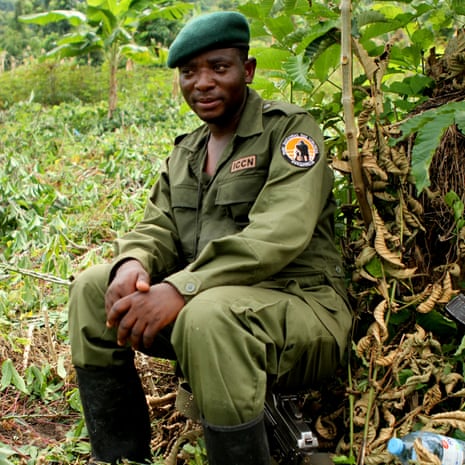As an enforced child soldier, Rodrigue Katembo saw his little brother die and had to carry the news to his mother. Now 41, he remains on the frontline – but today he protects the extraordinary wildlife in the national parks of the Democratic Republic of Congo (DRC) from armed militias.
It is exceptionally dangerous work: 160 park rangers have been killed protecting Virunga national park in the last 15 years, outnumbered 10 to one by militias and poachers. Around the world, about 1,000 rangers have died in the line of duty over the last decade. But Katembo, who is awarded the prestigious Goldman environmental prize on Monday, is resolute, despite the attacks he has endured and the risks he continues to run.
“It is really worth it to make this sacrifice,” he told the Guardian. “I know it is among the most dangerous work in DRC, but I am working for the welfare of future generations.” His goal is to protect the rainforests and savannahs of Congo’s parks, and the endangered mountain gorillas, lions and elephants they contain, and build a sustainable way of life for the many thousands of people living there.
Katembo has made heavy personal sacrifices in the fight against the corruption that helps fuel the destruction. In 2013, just days after stopping an oil-related development, he was arrested. “I was tortured and put in jail for 17 days,” he said, adding that he also suffered mock executions. “That was a really difficult time for me and my family as we didn’t know if I was going to die in prison or not.”

Katembo survived and in 2015 the company pursuing oil in Virunga, a Unesco world heritage site, abandoned its plans. However, continuing death threats from poachers, armed rebels and illegal miners led to his transfer to Upemba national park, though even there he has to live apart from his family for their safety.
The source of Katembo’s courage and determination began with his love of the natural world: “Since I was very young, I really wanted to become part of the wildlife authority of Congo.”
The best moments in his dangerous job are in the bush, he says: “Many times as a chief warden, you take your rangers on patrol. You look at tracks and follow the wildlife, but every time you do that you are amazed at the beauty of the wildlife of Congo. Every time you see new things and make new discoveries – it’s marvellous.”
Katembo lists his successes with pride: “We saw the population of hippos in Virunga go from 500 to 1,700 in three to four years – that was a really important moment for me. In Upemba in 2015, we only had 54 zebra, we now have 72. We had no elephants inside the park, but now we have 68.”

Katembo’s early love of wildlife and desire to serve his war-torn country was derailed at the age of 14. “One of the armed groups tricked me and said they were going to bring me to university,” he says. “In the end, I started to be a child soldier. Many of the youths that tried to run away were killed. But I stayed there for two years.”
“I was then able to go home during some holidays,” Katembo says. “I had to tell my mother that my younger brother had been killed in front of my eyes. My mother really fought to try to stop me having to return and I was able to escape. My mother then did everything she could to pay for my schooling and thanks to her I was able to study.”
Katembo joined the DRC wildlife authority in 2003, which funded further study, and he has risen fast. He says he takes strength from the teams he works with but also from the responsibility he bears: “It is really important they trust me and see in me someone whose leadership is bringing them support and who is giving an example.”

His work in Upemba is daunting. The park covers 1.75m hectares and contains spectacular wildlife, including leopards and the Katanga impala, found only there. But there are also gold, emeralds and coltan – a highly valuable ore used in electronics - which draws illegal mining. Katembo has already closed down eight coltan mines and removed 1,400 small-scale miners.
But the murderous Katanga Mai Mai militia have infiltrated the park, making the need for more resources even more urgent. Katembo has just 160 rangers, far short of the 400 needed, and a single patrol truck.
Nonetheless, Katembo is not ready to back down from the fight. “It is not the time to do something else. When we see how many [groups] are trying to destroy our protected areas, we cannot stop now. If I left, that would feel like a betrayal to the protections the wildlife and national parks deserve. I also need to ensure a new generation of young Congolese are there to take up the baton.”
